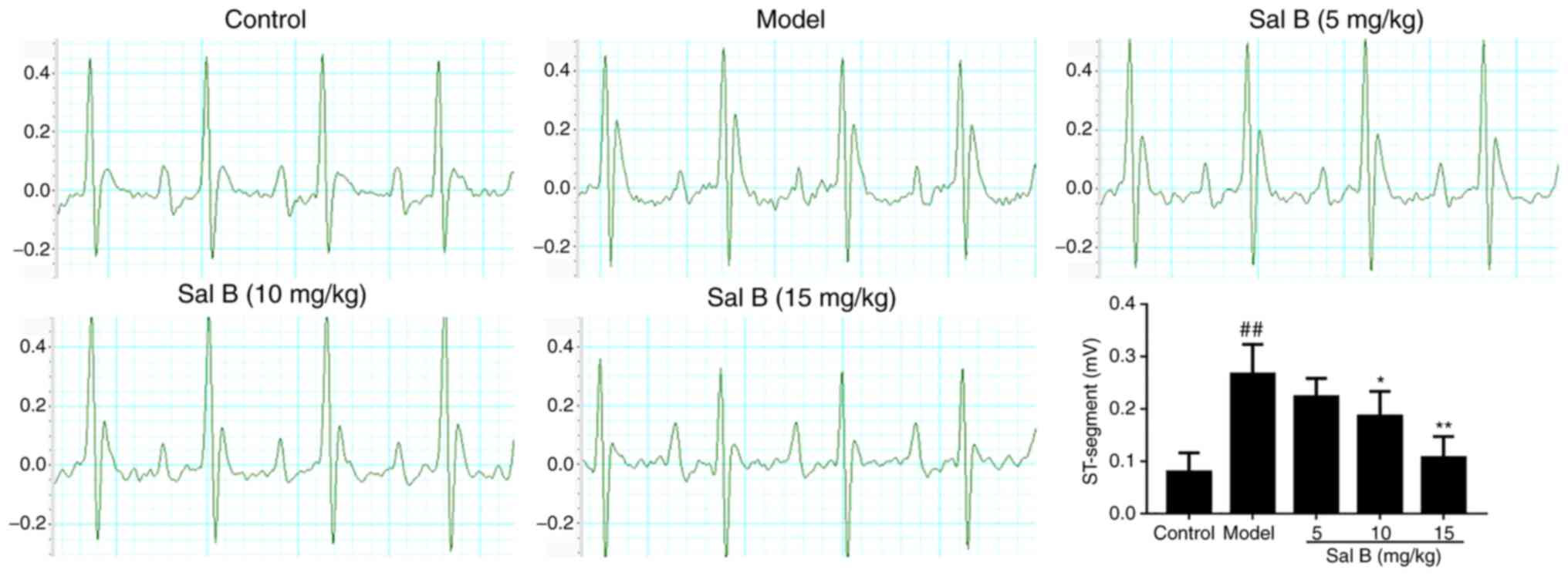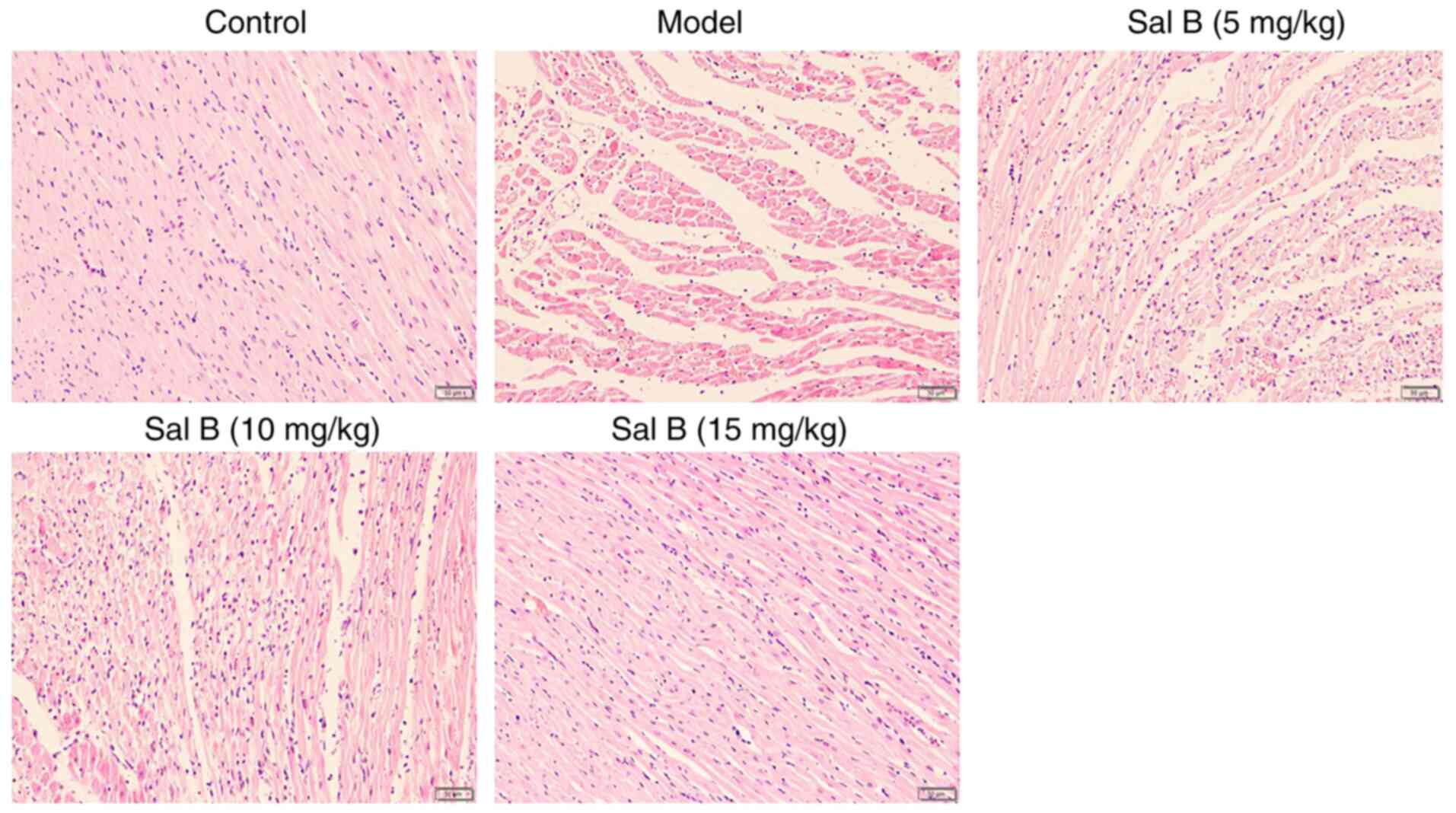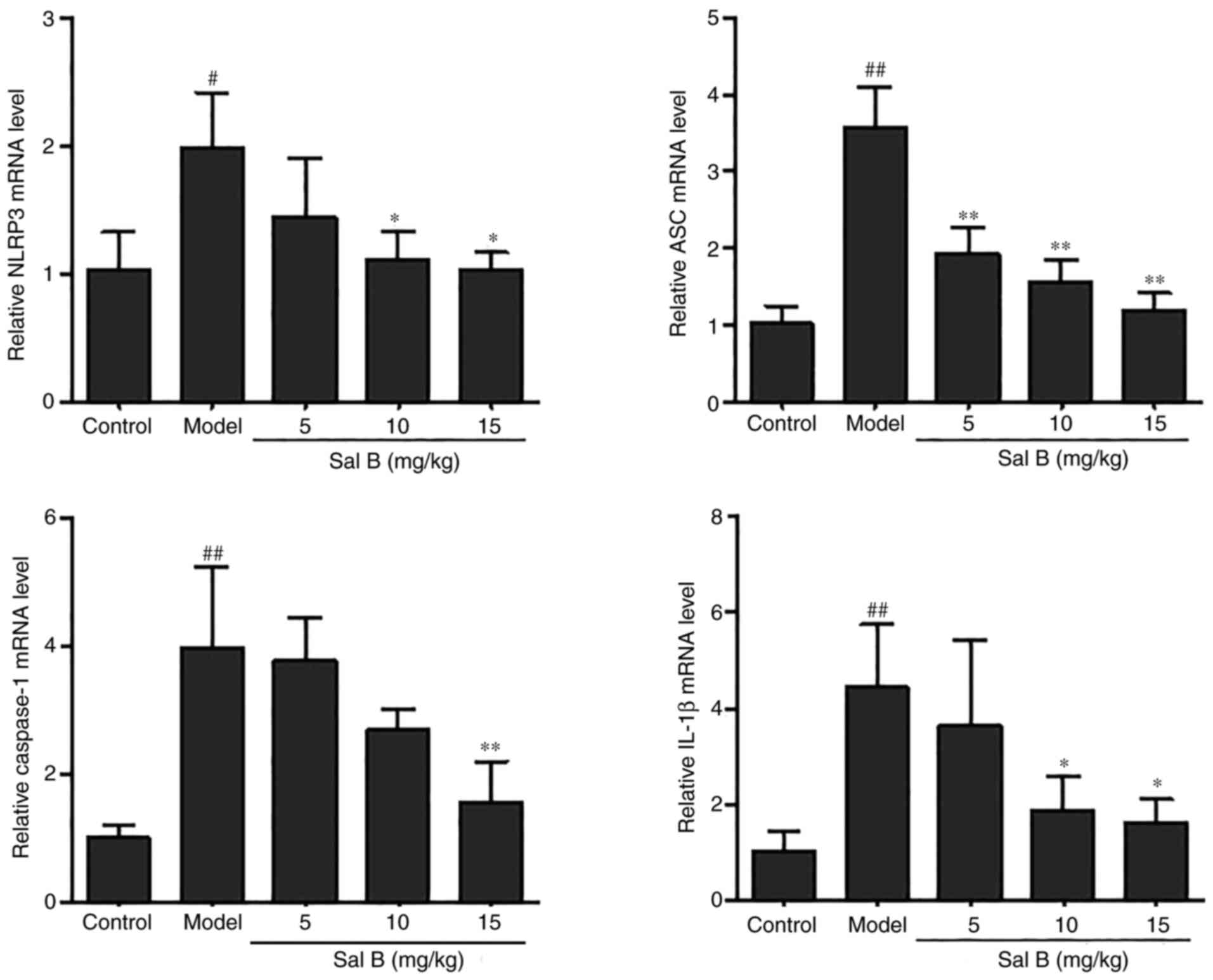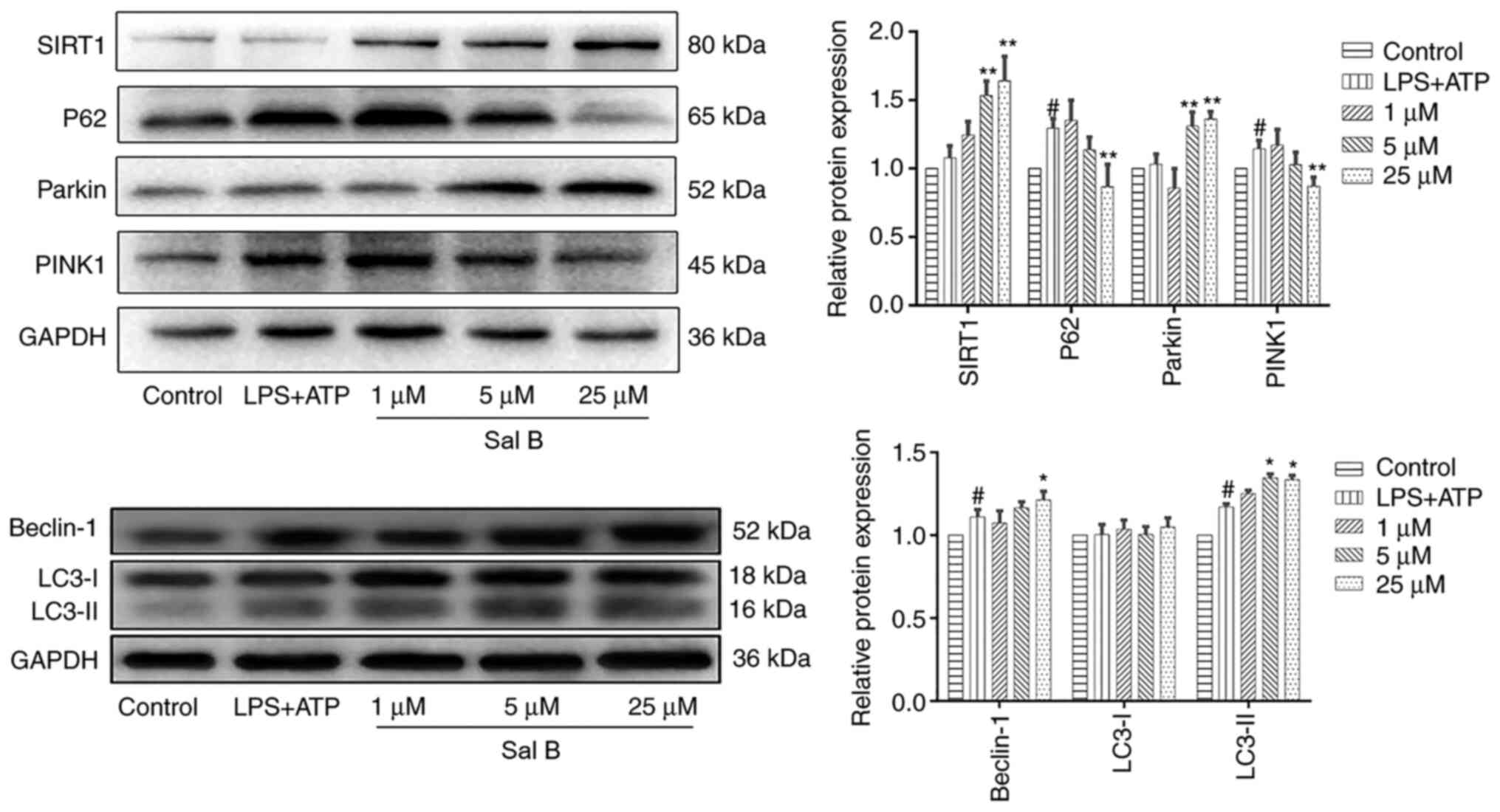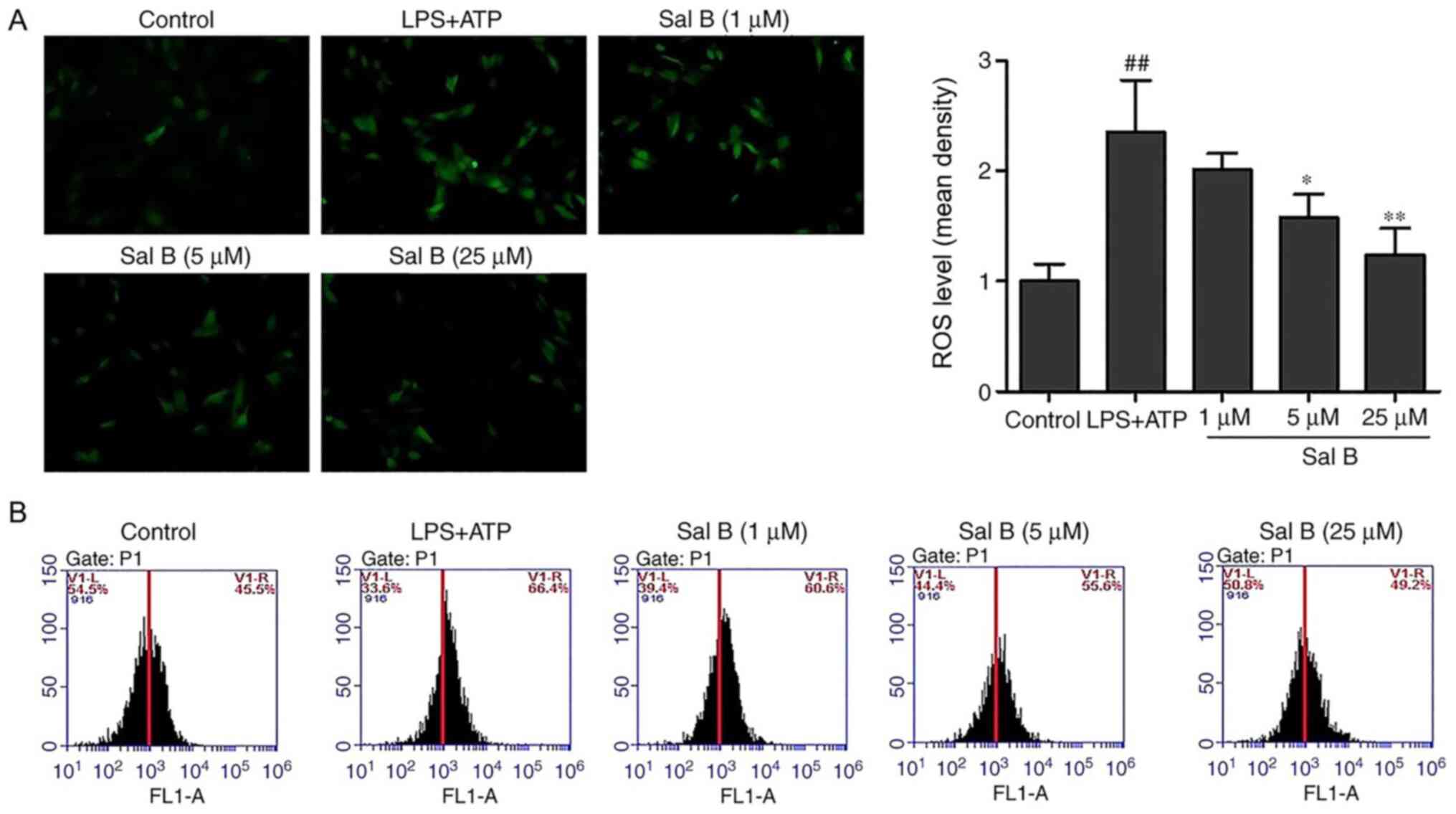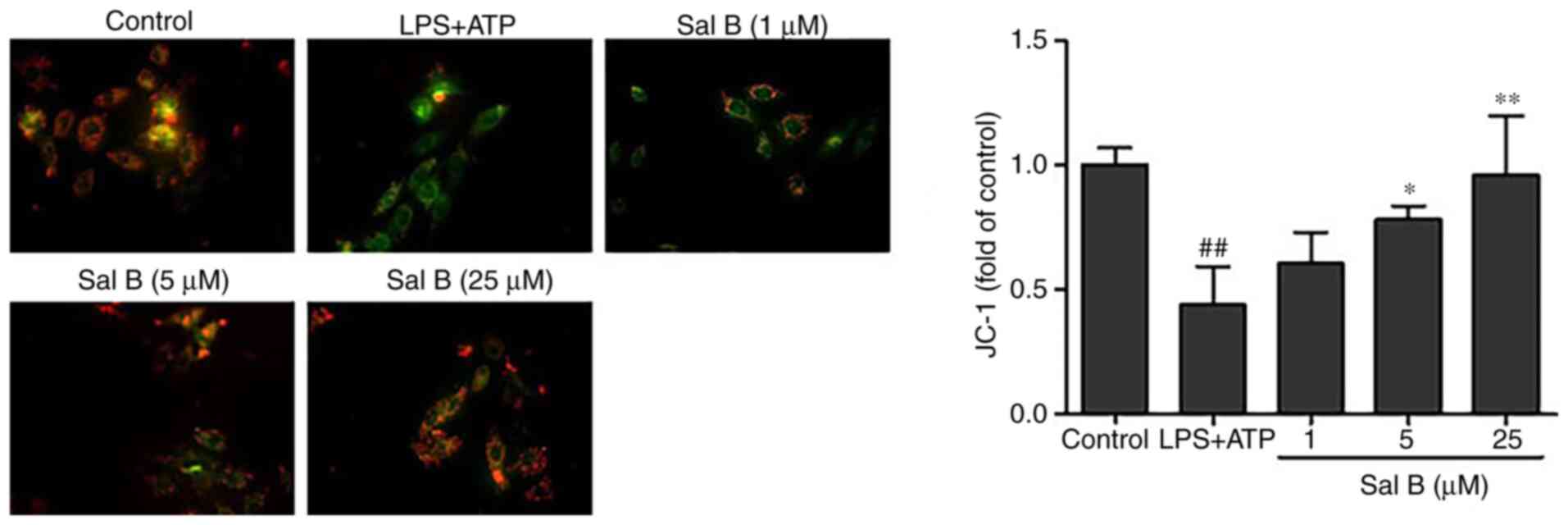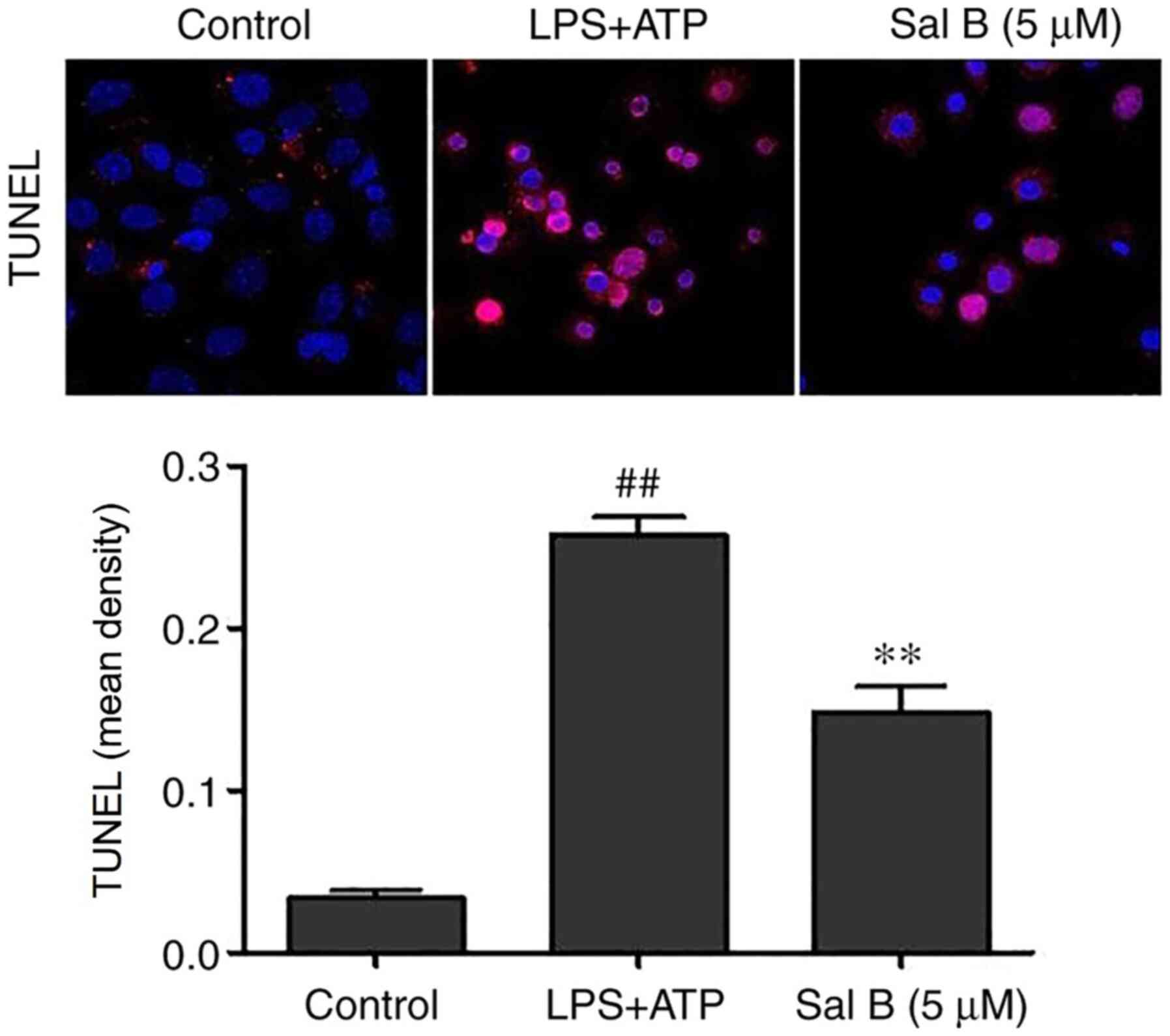|
1
|
Chen WW, Gao RL, Liu LS, Zhu ML, Wang W,
Wang YJ, Wu ZS, Li HJ, Gu DF, Yang YJ, et al: China cardiovascular
diseases report 2015: A summary. J Geriatr Cardiol. 14:1–10.
2017.PubMed/NCBI
|
|
2
|
Kang PF, Wu WJ, Tang Y, Xuan L, Guan SD,
Tang B, Zhang H, Gao Q and Wang HJ: Activation of ALDH2 with low
concentration of ethanol attenuates myocardial ischemia/reperfusion
injury in diabetes rat model. Oxid Med Cell Longev.
2016:61905042016. View Article : Google Scholar : PubMed/NCBI
|
|
3
|
Cao DJ, Schiattarella GG, Villalobos E,
Jiang N, May HI, Li T, Chen ZJ, Gillette TG and Hill JA: Cytosolic
DNA sensing promotes macrophage transformation and governs
myocardial ischemic injury. Circulation. 137:2613–2634. 2018.
View Article : Google Scholar : PubMed/NCBI
|
|
4
|
Jiang S, Liu Y, Wang J, Zhang Y, Rui Y,
Zhang Y and Li T: Cardioprotective effects of monocyte locomotion
inhibitory factor on myocardial ischemic injury by targeting
vimentin. Life Sci. 167:85–91. 2016. View Article : Google Scholar : PubMed/NCBI
|
|
5
|
Zhu L, Wei T, Gao J, Chang X, He H, Luo F,
Zhou R, Ma C, Liu Y and Yan T: The cardioprotective effect of
salidroside against myocardial ischemia reperfusion injury in rats
by inhibiting apoptosis and inflammation. Apoptosis. 20:1433–1443.
2015. View Article : Google Scholar : PubMed/NCBI
|
|
6
|
Marchetti C, Toldo S, Chojnacki J,
Mezzaroma E, Liu K, Salloum FN, Nordio A, Carbone S, Mauro AG, Das
A, et al: Pharmacologic inhibition of the NLRP3 inflammasome
preserves cardiac function after ischemic and nonischemic injury in
the mouse. J Cardiovasc Pharmacol. 66:1–8. 2015. View Article : Google Scholar : PubMed/NCBI
|
|
7
|
Swanson KV, Deng M and Ting JP: The NLRP3
inflammasome: Molecular activation and regulation to therapeutics.
Nat Rev Immunol. 19:477–489. 2019. View Article : Google Scholar : PubMed/NCBI
|
|
8
|
He Q, Li Z, Meng C, Wu J, Zhao Y and Zhao
J: Parkin-dependent mitophagy is required for the inhibition of
ATF4 on NLRP3 inflammasome activation in cerebral
ischemia-reperfusion injury in rats. Cells. 82019
|
|
9
|
Wan Z, Fan Y, Liu X, Xue J, Han Z, Zhu C
and Wang X: NLRP3 inflammasome promotes diabetes-induced
endothelial inflammation and atherosclerosis. Diabetes Metab Syndr
Obes. 12:1931–1942. 2019. View Article : Google Scholar : PubMed/NCBI
|
|
10
|
Mao L, Kitani A, Strober W and Fuss IJ:
The role of NLRP3 and IL-1β in the pathogenesis of inflammatory
bowel disease. Front Immunol. 9:25662018. View Article : Google Scholar : PubMed/NCBI
|
|
11
|
Toldo S, Marchetti C, Mauro AG, Chojnacki
J, Mezzaroma E, Carbone S, Zhang S, Van Tassell B, Salloum FN and
Abbate A: Inhibition of the NLRP3 inflammasome limits the
inflammatory injury following myocardial ischemia-reperfusion in
the mouse. Int J Cardiol. 209:215–220. 2016. View Article : Google Scholar : PubMed/NCBI
|
|
12
|
Han Y, Luo H, Wang H, Cai J and Zhang Y:
SIRT1 induces resistance to apoptosis in human granulosa cells by
activating the ERK pathway and inhibiting NF-κB signaling with
anti-inflammatory functions. Apoptosis. 22:1260–1272. 2017.
View Article : Google Scholar : PubMed/NCBI
|
|
13
|
Wong WT, Li LH, Rao YK, Yang SP, Cheng SM,
Lin WY, Cheng CC, Chen A and Hua KF: Repositioning of the
beta-blocker carvedilol as a novel autophagy inducer that inhibits
the NLRP3 inflammasome. Front Immunol. 9:19202018. View Article : Google Scholar : PubMed/NCBI
|
|
14
|
Akkafa F, Halil Altiparmak I, Erkus ME,
Aksoy N, Kaya C, Ozer A, Sezen H, Oztuzcu S, Koyuncu I and Umurhan
B: Reduced SIRT1 expression correlates with enhanced oxidative
stress in compensated and decompensated heart failure. Redox Biol.
6:169–173. 2015. View Article : Google Scholar : PubMed/NCBI
|
|
15
|
Wang L, Ma R, Liu C, Liu H, Zhu R, Guo S,
Tang M, Li Y, Niu J, Fu M, et al: Salvia miltiorrhiza: A
potential red light to the development of cardiovascular diseases.
Curr Pharm Des. 23:1077–1097. 2017. View Article : Google Scholar : PubMed/NCBI
|
|
16
|
Han F, Xing RH, Chen LQ, Chen L, Xiong W,
Yang M and Zhao ZD: Research progress of anti-drug resistance in
traditional Chinese medicine. Zhongguo Zhong Yao Za Zhi.
41:813–817. 2016.(In Chinese). PubMed/NCBI
|
|
17
|
Gong L, Di C, Xia X, Wang J, Chen G, Shi
J, Chen P, Xu H and Zhang W: AKT/mTOR signaling pathway is involved
in salvianolic acid B-induced autophagy and apoptosis in
hepatocellular carcinoma cells. Int J Oncol. 49:2538–2548. 2016.
View Article : Google Scholar : PubMed/NCBI
|
|
18
|
Lou Y, Wang C, Zheng W, Tang Q, Chen Y,
Zhang X, Guo X and Wang J: Salvianolic acid B inhibits
IL-1β-induced inflammatory cytokine production in human
osteoarthritis chondrocytes and has a protective effect in a mouse
osteoarthritis model. Int Immunopharmacol. 46:31–37. 2017.
View Article : Google Scholar : PubMed/NCBI
|
|
19
|
Liu X, Xavier C, Jann J and Wu H:
Salvianolic acid B (Sal B) protects retinal pigment epithelial
cells from oxidative stress-induced cell death by activating
glutaredoxin 1 (Grx1). Int J Mol Sci. 17:18352016. View Article : Google Scholar
|
|
20
|
Li D, Wang J, Hou J, Fu J, Liu J and Lin
R: Salvianolic acid B induced upregulation of miR-30a protects
cardiac myocytes from ischemia/reperfusion injury. BMC Complement
Altern Med. 16:3362016. View Article : Google Scholar : PubMed/NCBI
|
|
21
|
Dhivya V, Priya LB, Chirayil HT,
Sathiskumar S, Huang CY and Padma VV: Piperine modulates
isoproterenol induced myocardial ischemia through antioxidant and
anti-dyslipidemic effect in male Wistar rats. Biomed Pharmacother.
87:705–713. 2017. View Article : Google Scholar : PubMed/NCBI
|
|
22
|
Ke Z, Wang G, Yang L, Qiu H, Wu H, Du M,
Chen J, Song J, Jia X and Feng L: Crude terpene glycoside component
from Radix paeoniae rubra protects against isoproterenol-induced
myocardial ischemic injury via activation of the PI3K/AKT/mTOR
signaling pathway. J Ethnopharmacol. 206:160–169. 2017. View Article : Google Scholar : PubMed/NCBI
|
|
23
|
Livak KJ and Schmittgen TD: Analysis of
relative gene expression data using real-time quantitative PCR and
the 2(-Delta Delta C(T)) Method. Methods. 25:402–408. 2001.
View Article : Google Scholar : PubMed/NCBI
|
|
24
|
Huang X, Zuo L, Lv Y, Chen C, Yang Y, Xin
H, Li Y and Qian Y: Asiatic acid attenuates myocardial
ischemia/reperfusion injury via Akt/GSK-3β/HIF-1α signaling in rat
H9c2 cardiomyocytes. Molecules. 21:212016. View Article : Google Scholar
|
|
25
|
Li P, Lin N, Guo M, Huang H, Yu T and
Zhang L: REDD1 knockdown protects H9c2 cells against myocardial
ischemia/reperfusion injury through Akt/mTORC1/Nrf2
pathway-ameliorated oxidative stress: An in vitro study. Biochem
Biophys Res Commun. 519:179–185. 2019. View Article : Google Scholar : PubMed/NCBI
|
|
26
|
Zou J, Zhang Y, Sun J, Wang X, Tu H, Geng
S, Liu R, Chen Y and Bi Z: Deoxyelephantopin induces reactive
oxygen species-mediated apoptosis and autophagy in human
osteosarcoma cells. Cell Physiol Biochem. 42:1812–1821. 2017.
View Article : Google Scholar : PubMed/NCBI
|
|
27
|
Zhang X, Du Q, Yang Y, Wang J, Dou S, Liu
C and Duan J: The protective effect of Luteolin on myocardial
ischemia/reperfusion (I/R) injury through TLR4/NF-κB/NLRP3
inflammasome pathway. Biomed Pharmacother. 91:1042–1052. 2017.
View Article : Google Scholar : PubMed/NCBI
|
|
28
|
Xue W, Wang X, Tang H, Sun F, Zhu H, Huang
D and Dong L: Vitexin attenuates myocardial ischemia/reperfusion
injury in rats by regulating mitochondrial dysfunction induced by
mitochondrial dynamics imbalance. Biomed Pharmacother.
124:1098492020. View Article : Google Scholar : PubMed/NCBI
|
|
29
|
Youle RJ and Narendra DP: Mechanisms of
mitophagy. Nat Rev Mol Cell Biol. 12:9–14. 2011. View Article : Google Scholar : PubMed/NCBI
|
|
30
|
Wang M, Wang R, Xie X, Sun G and Sun X:
Araloside C protects H9c2 cardiomyoblasts against oxidative stress
via the modulation of mitochondrial function. Biomed Pharmacother.
117:1091432019. View Article : Google Scholar : PubMed/NCBI
|
|
31
|
Wu C, Zhao W, Yu J, Li S, Lin L and Chen
X: Induction of ferroptosis and mitochondrial dysfunction by
oxidative stress in PC12 cells. Sci Rep. 8:5742018. View Article : Google Scholar : PubMed/NCBI
|
|
32
|
Kim MJ, Yoon JH and Ryu JH: Mitophagy: A
balance regulator of NLRP3 inflammasome activation. BMB Rep.
49:529–535. 2016. View Article : Google Scholar : PubMed/NCBI
|
|
33
|
He Y, Hara H and Núñez G: Mechanism and
regulation of NLRP3 inflammasome activation. Trends Biochem Sci.
41:1012–1021. 2016. View Article : Google Scholar : PubMed/NCBI
|
|
34
|
Hammadah M, Sullivan S, Pearce B, Al Mheid
I, Wilmot K, Ramadan R, Tahhan AS, O'Neal WT, Obideen M, Alkhoder
A, et al: Inflammatory response to mental stress and mental stress
induced myocardial ischemia. Brain Behav Immun. 68:90–97. 2018.
View Article : Google Scholar : PubMed/NCBI
|
|
35
|
Hansson GK: Inflammation, atherosclerosis,
and coronary artery disease. N Engl J Med. 352:1685–1695. 2005.
View Article : Google Scholar : PubMed/NCBI
|
|
36
|
Mangan MSJ, Olhava EJ, Roush WR, Seidel
HM, Glick GD and Latz E: Targeting the NLRP3 inflammasome in
inflammatory diseases. Nat Rev Drug Discov. 17:588–606. 2018.
View Article : Google Scholar : PubMed/NCBI
|
|
37
|
Wang DS, Yan LY, Yang DZ, Lyu Y, Fang LH,
Wang SB and Du GH: Formononetin ameliorates myocardial
ischemia/reperfusion injury in rats by suppressing the
ROS-TXNIP-NLRP3 pathway. Biochem Biophys Res Commun. 525:759–766.
2020. View Article : Google Scholar : PubMed/NCBI
|
|
38
|
Yuan X, Juan Z, Zhang R, Sun X, Yan R, Yue
F, Huang Y, Yu J and Xia X: Clemastine fumarate protects against
myocardial ischemia reperfusion injury by activating the
TLR4/PI3K/Akt signaling pathway. Front Pharmacol. 11:282020.
View Article : Google Scholar : PubMed/NCBI
|
|
39
|
Gong Z, Pan J, Shen Q, Li M and Peng Y:
Mitochondrial dysfunction induces NLRP3 inflammasome activation
during cerebral ischemia/reperfusion injury. J Neuroinflammation.
15:2422018. View Article : Google Scholar : PubMed/NCBI
|
|
40
|
Latz E, Xiao TS and Stutz A: Activation
and regulation of the inflammasomes. Nat Rev Immunol. 13:397–411.
2013. View Article : Google Scholar : PubMed/NCBI
|
|
41
|
Hu Y, Li Q, Pan Y and Xu L: Sal B
alleviates myocardial ischemic injury by inhibiting TLR4 and the
priming phase of NLRP3 inflammasome. Molecules. 242019.
|
|
42
|
Zhu W, Liu F, Wang L, Yang B, Bai Y, Huang
Y, Li Y, Li W, Yuan Y, Chen C, et al: pPolyHb protects myocardial
H9C2 cells against ischemia-reperfusion injury by regulating the
Pink1-Parkin-mediated mitochondrial autophagy pathway. Artif Cells
Nanomed Biotechnol. 47:1248–1255. 2019. View Article : Google Scholar : PubMed/NCBI
|
|
43
|
Villanueva Paz M, Cotán D, Garrido-Maraver
J, Cordero MD, Oropesa-Ávila M, de La Mata M, Delgado Pavón A, de
Lavera I, Alcocer-Gómez E and Sánchez-Alcázar JA: Targeting
autophagy and mitophagy for mitochondrial diseases treatment.
Expert Opin Ther Targets. 20:487–500. 2016. View Article : Google Scholar : PubMed/NCBI
|
|
44
|
Das S, Mitrovsky G, Vasanthi HR and Das
DK: Antiaging properties of a grape-derived antioxidant are
regulated by mitochondrial balance of fusion and fission leading to
mitophagy triggered by a signaling network of
Sirt1-Sirt3-Foxo3-PINK1-PARKIN. Oxid Med Cell Longev.
2014:3451052014. View Article : Google Scholar : PubMed/NCBI
|
|
45
|
Mai CT, Wu MM, Wang CL, Su ZR, Cheng YY
and Zhang XJ: Palmatine attenuated dextran sulfate sodium
(DSS)-induced colitis via promoting mitophagy-mediated NLRP3
inflammasome inactivation. Mol Immunol. 105:76–85. 2019. View Article : Google Scholar : PubMed/NCBI
|
|
46
|
Cao S, Shrestha S, Li J, Yu X, Chen J, Yan
F, Ying G, Gu C, Wang L and Chen G: Melatonin-mediated mitophagy
protects against early brain injury after subarachnoid hemorrhage
through inhibition of NLRP3 inflammasome activation. Sci Rep.
7:24172017. View Article : Google Scholar : PubMed/NCBI
|















